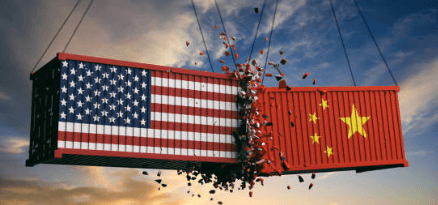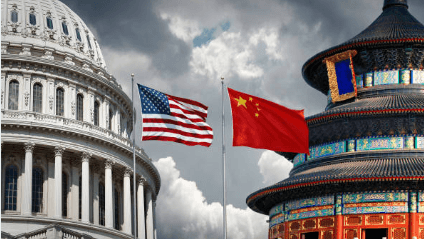Trump’s Trade War with China Is Impacting Japan’s Economy
For decades, Japan has walked a fine line between two economic giants — the United States and China. Both countries are key trade partners for Japan, but the U.S.-China trade war, ignited during former President Donald Trump’s administration, has made that balancing act much more difficult.
🌏 Japan’s Position: Between Two Powers
Japan depends heavily on both the U.S. and China:
The United States is a major security ally and a crucial export market.
China is Japan’s largest trading partner, especially for manufacturing and technology.
In the past, Japan successfully managed relations with both countries by avoiding direct conflict and focusing on economic cooperation. But the U.S.-China trade tensions have forced Japan into an uncomfortable position: how to protect its own interests without choosing sides.
💼
What Is the U.S.-China Trade War?
The trade war began in 2018, when the Trump administration imposed heavy tariffs on Chinese imports, accusing China of unfair trade practices, intellectual property theft, and currency manipulation. China responded with its own tariffs on U.S. goods.
This tit-for-tat tariff battle disrupted global trade and created uncertainty for countries like Japan that rely on stable international markets.
🏭 How It Affects Japan’s Economy
The impact on Japan has been significant:
Supply Chain Disruptions: Japanese companies often have factories or suppliers in China. When tariffs increased, it disrupted manufacturing and raised costs.
Export Pressures: Japanese products often include Chinese components. When Chinese exports to the U.S. were taxed, Japanese goods also became less competitive.
Business Uncertainty: Companies like Toyota, Sony, and Panasonic rely on global supply chains. The trade war made it harder to plan long-term investments.
Yen Fluctuations: Investors moved toward the Japanese yen as a “safe haven” during the trade war, strengthening it — which made Japanese exports more expensive.

U.S.-China Trade War: What It Means for Japan’s Economy and Future Strategy
🎯 Japan’s Response: Careful Diplomacy
Japan didn’t take sides publicly during the Trump-era trade conflict. Instead, it focused on a few key strategies:
Free Trade Agreements: Japan signed deals like the Comprehensive and Progressive Agreement for Trans-Pacific Partnership (CPTPP) to reduce dependence on U.S.-China trade.
Diversification: Japanese firms started moving parts of their supply chains to countries like Vietnam, India, and Thailand to avoid tariffs and reduce risk.
Stronger Regional Ties: Japan worked more closely with Southeast Asian nations and even with Europe to expand trade opportunities.
🛡️ Security vs. Trade: A Tough Balance
While Japan has deep economic ties with China, its security alliance with the U.S. is vital — especially in the face of growing tensions over Taiwan, the South China Sea, and regional defense.
This makes Japan’s position complex: siding too closely with China could upset the U.S., while standing too firm with the U.S. could hurt business with China.
📉 Long-Term Risks for Japan
Japan’s challenge is not just about trade. The bigger issue is economic security — making sure the country isn’t too dependent on any one nation.
The trade war exposed Japan’s vulnerabilities, including:
Over-reliance on Chinese manufacturing
Risk of being caught in political crossfire
Difficulty in staying neutral when global powers clash
🔍 Looking Ahead: What Japan Can Do
As tensions between the U.S. and China continue, Japan is taking steps to protect its interests:
Investing in technology and AI to stay competitive globally.
Bringing some production back home to reduce reliance on foreign factories.
Supporting innovation to make Japan a leader in clean energy, robotics, and digital infrastructure.
At the same time, Japan is using its role as a stable, respected nation to promote open trade, global cooperation, and peaceful dialogue between major powers.
🧠 Final Thoughts
Japan is in a tight spot, caught between its two biggest trade partners. But with smart diplomacy, flexible economic strategies, and global leadership, Japan can still thrive in a world shaped by U.S.-China rivalry.
The key for Japan is to stay adaptive, independent, and focused on long-term resilience — because the global trade game is changing, and neutrality is no longer easy.
Contect us: Permalink: https://sociallif.com/contact-us/
About us: Permalink: https://sociallif.com/about-us/
Disclaimer: Permalink: https://sociallif.com/disclaimer/
Home: Permalink: https://sociallif.com/home/
Latest post: Permalink: https://sociallif.com/latest-post/
Privacy Policy: Permalink: https://sociallif.com/privacy-policy/
Term and condition: Permalink: https://sociallif.com/terms-and-conditions/
Permalink: https://sociallif.com/foods-that-natur…x-your-body-2025/ Edit
“Powerful Tips to Create Instagram Reels That Actually Make Money” 2025 Permalink: https://sociallif.com/create-instagram-reels-in-2025/
Free AI Tools That Save Time for Social Media Managers 2025
Permalink: https://sociallif.com/free-ai-tools-fo…ia-managers-2025/
How to Create Social Media Posts to Promote Your Blog on Instagram, Facebook, and Pinterest 2025
Permalink: https://sociallif.com/how-to-create-so…media-posts-2025/
Proven Tips: How to Use ChatGPT to Write Blog Posts Faster and Smarter” 2025
Permalink: https://sociallif.com/proven-tips-how-…and-smarter-2025/
Best Apps to Earn Passive Income While You Sleep 2025
Permalink: https://sociallif.com/best-apps-to-ear…e-you-sleep-2025/
How to Lose Belly Fat Naturally Without Diet Pills
Permalink: https://sociallif.com/how-to-lose-bell…thout-diet-pills/
10 Best Healthy Foods for Glowing Skin Naturally
Permalink: https://sociallif.com/10-best-healthy-…g-skin-naturally/

